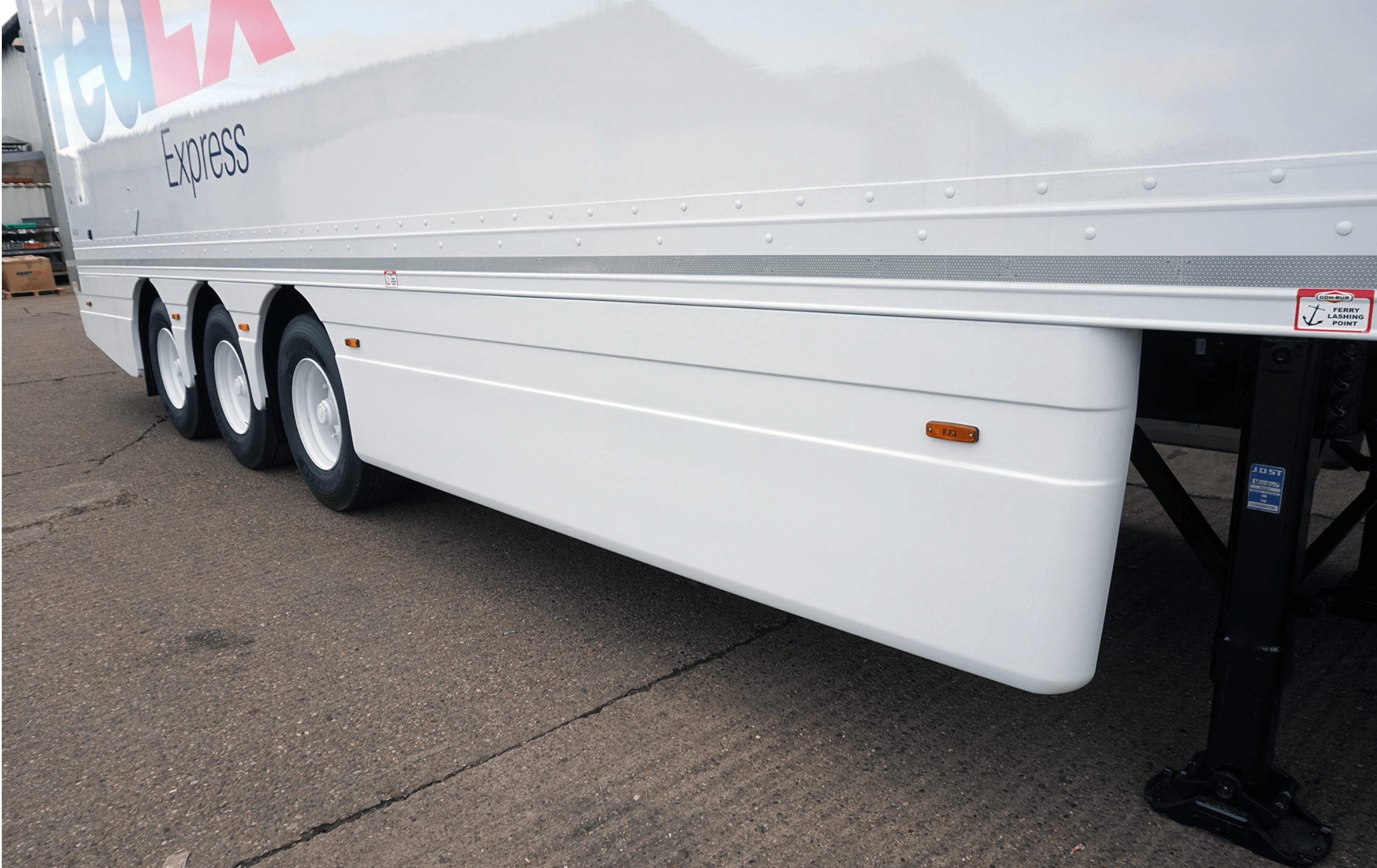At first, Quon Kwan says he didn't think of the research project that would change his life as a "safety study."
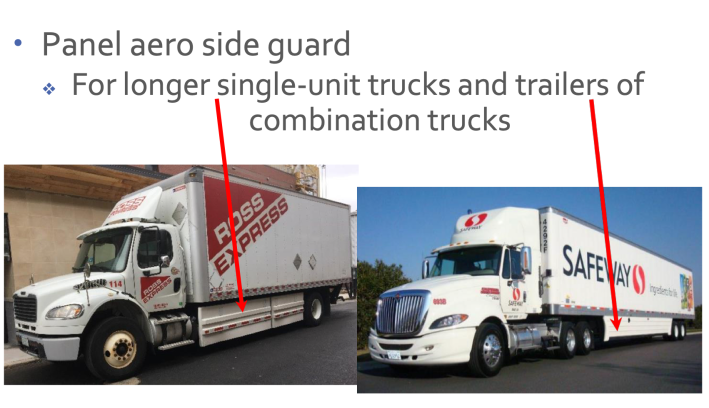
As an engineer at the Federal Motor Carrier Safety Administration with $200,000 in taxpayer-sponsored research funding in hand, he'd initially set out to explore whether installing aerodynamic "skirts" on the sides of large trucks might improve their fuel efficiency. He also suspected that those same panels could be reinforced to prevent pedestrians and bicyclists from being swept under a truck's wheels in a crash, potentially saving hundreds of lives a year while simultaneously saving money and the climate.
Two years later, Kwan and a team of collaborators at the federal Department of Transportation's Volpe Center had come to that exact conclusion, submitting reams of evidence that "panel aero side guards" could not only save vulnerable road user lives in deadly "underride" crashes, but that they would quickly pay for themselves in avoided fuel costs. That report, he thought, would be a proud capstone on a nearly 20-year career in government as he retired to pursue a masters of divinity program and devote his days to studying Hebrew and Ancient Greek.
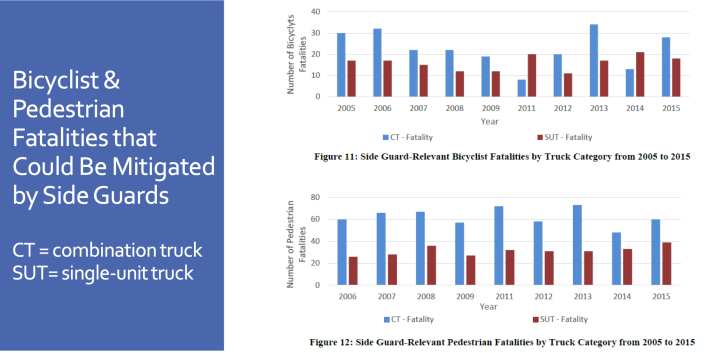
Just a year after that, though, that happy retirement was interrupted when Kwan's report was finally released to the public — in a form that was almost unrecognizable to its author.
Around 70 pages of work had been stripped out, along with any mention of the pedestrians and cyclists who could have been saved if side guards were widely deployed. Most important, the conclusion — that installing them met the government's threshold for a cost efficient regulation — was gone, too. What remained was little more than a literature review.
Kwan's saga eventually became one of the most disturbing storylines in a series of ProPublica investigations into the mysterious reasons why US DOT has, so far, recommended against mandating side guards on all large trucks. In April 2024, he took an even more public stance, submitting a fiery testimony to NHTSA's Advisory Committee on Underride Protection that accused the agency of bowing to pressure from the American Trucking Associations to "doctor" his work.
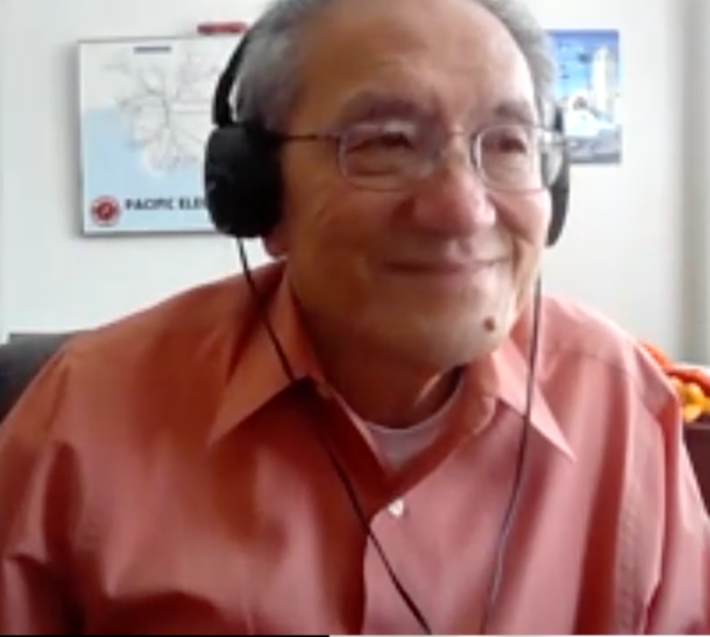
"Suppressing this research was unacceptable and wrong," he wrote. "The cost of [the American Trucking Associations'] influence with officials in the U.S. DOT will be borne by many more innocent victims."
Kwan may not have ever become a whistleblower, though, had he not been contacted by an advocate, Marianne Karth, who stumbled on his troubled research project while searching for more evidence on how to save lives in underride crashes. Karth's two daughters — Mary (13) and AnnaLeah (17) — where killed when a truck driver struck the family's car in 2013, forcing the back seat of the vehicle underneath the body of another tractor-trailer.
One of the girls died that same day; the other succumbed to her injuries several days later.
"Being an engineer, you're usually isolated from the personal impact of the work that you do," Kwan said in an emotional interview with Streetsblog. "You're working with paper, with numbers, with statistics, and maybe once in a while, you get to go out the field. ... But very rarely — almost none of the time — do we ever get to talk to the victims or people who are impacted by what you do."

Engineers are often insulated from the agony of traffic violence and the victims who endure it, but trucking industry lobbyists are often welcomed into their offices, ostensibly to provide expertise on the field that government research might someday help to regulate.
Kwan himself initially welcomed the opportunity to consult the trucking industry as "peer reviewers," just as he had on countless other projects. With the blessing of his FMCSA supervisors, he briefed the American Trucking Associations on his side guard research in 2018, and even gave them an early copy of the draft report.
The group did offer technical guidance — but they also reacted strongly to how may truck crashes resulted in the death of vulnerable road users, which numbered 569 in 2019 alone, despite the fact that big rigs spend most of their time on highways, rather than in cities where people walk and roll. Side guards wouldn't prevent all of those deaths, but Kwan didn't expect industry leaders to dismiss a powerful tool to save who they could — or to place blame on the victims. (The American Trucking Associations did not comment on Kwon's comment's for this story.)
"They kind of made some comments that showed they were not pleased with the idea of side guards," Kwan added. "They made a comment like, 'Well, why should we pay for the cost of injuries and fatalities caused by idiots? [These are] people who don't watch out for trucks.'"
After that contentious meeting — and, he says, a call from his supervisor — Kwan agreed to "tone down" the wording of his report and recommend the trucking industry enter into a voluntary agreement to install side guards on new vehicles, which he found would cost operators between $1,250 and $1,850 up front, but save them money in the long run, since maintenance would cost just $7.27 a year.
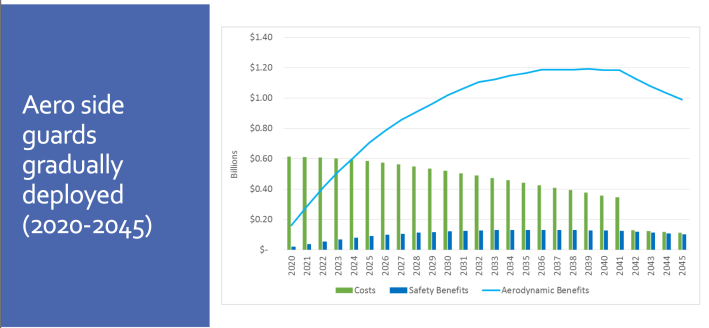
According to Kwan, though, even that concession still rankled the National Highway Traffic Safety Administration, which would be responsible for regulating truck manufacturers in light of his report's recommendations. One NHTSA section leader with whom he hadn't even shared his report somehow got her hands on a copy and requested a meeting, where she raised questions about his cost-benefit analysis.
Instead of working with Kwan, she urged him to scrap the study entirely — a request he ignored, since he didn't work for NHTSA and didn't share her concerns about the data.
"There's a difference between not publishing the report and working something out to see where the discrepancy is. ... But she did not want to go ahead and do that," he said. "So since she was not my boss, I didn't feel I had to subject myself to her desires."
Now that he's left the world of engineering behind, Kwan will always wonder whether that section leader was the one who urged US DOT to water down his report after his retirement, or if someone else within the agency decided to "defraud the public" by altering his work, as he alleged in his letter to the committee. It also chafes him that $200,000 in taxpayer money was wasted, since the study didn't even give taxpayers the basic cost-benefit analysis that they'd paid for.
Mostly, though, he's upset that his research didn't help save lives.
"I think the reason [NHTSA revised the report] was that they did not want to pursue this any further," he added. "They had already made up their minds. They did not want to issue a regulation on side guards, and this report would have been in support of putting side guards on trucks. Because in almost all the cases, the benefits exceed the costs."
Kwan isn't sure how to change the culture at transportation agencies so more whistleblowers like him come forward when they believe potentially life-saving research is being suppressed. If they talked to more victims like Marianne Karth, though, maybe things would be different.
"People — and especially bureaucrats — they need to see the impact of their work," he added. "They need to see that they're really affecting lives out there, that they're not just pushing paper and pencil. And they just need to see how the whole thing ties together. ... In this special case, I got to see the whole picture."
A spokesperson for the U.S. DOT said that the federal government's National Roadway Safety Strategy remains committed to "improving roadway safety and achieving our goal of zero deaths."
The spokesperson cited the National Highway Traffic Safety Administration's recent effort to promulgate new rules to protect vulnerable road users outside America's increasingly large fleet.
But on the specifics of Kwan's charges, the agency said this:
"While the 2019 draft document on lateral protective devices contained valuable information, reviewers from both FMCSA and NHTSA had concerns about several material aspects of the draft, including the validity of the cost-benefit analysis, which is a required element for all NHTSA rules," the statement said. "The Department revised the document, and the 2020 publication took the form of a literature review with helpful information from the draft document.
"The Department continues to review the efficacy of side underride guards and is reviewing comments solicited through NHTSA’s April 2023 Advance Notice of Proposed Rulemaking."
